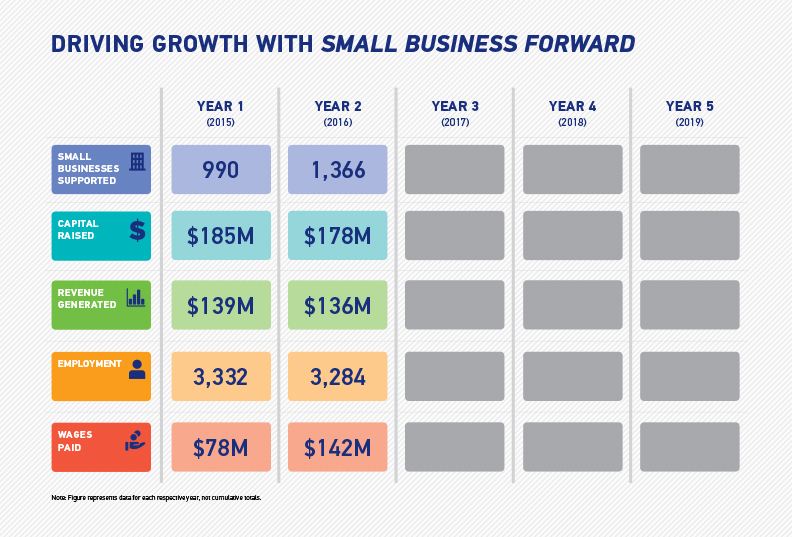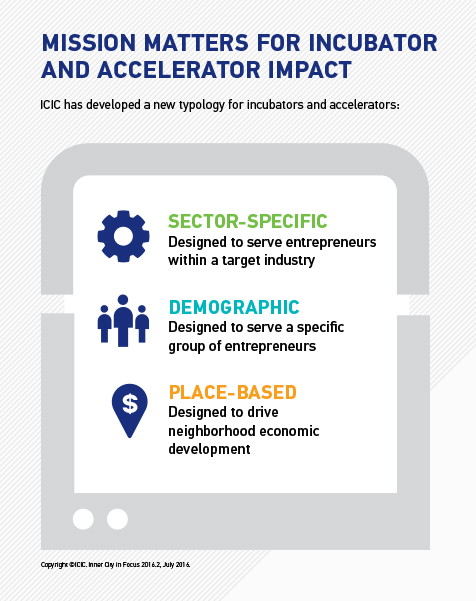Back

Blog
The Big Impact of Small Business Forward Grantees
Ted Archer, JPMorgan Chase & Co., and Kim Zeuli, ICIC
In 2016, 12 of the nation’s most innovative incubators and accelerators were awarded funding from JPMorgan Chase’s Small Business Forward initiative to support their growth and the growth of the small businesses they support. In sectors ranging from food to clean energy to water technology, the grant recipients are moving the needle in terms of job and wealth creation in over 10 cities in 8 states.
Launched in 2014, Small Business Forward is a five-year initiative working to support small businesses with the potential to grow, offer quality employment, generate economic opportunity, and strengthen local economies. Earlier this year, JPMorgan Chase announced an expansion of the program, more than doubling the bank’s commitment to $75 million, focused on supporting women-, minority- and veteran-owned small businesses with access to capital, technical support and guidance.
ICIC is proud to serve as a partner of Small Business Forward, annually measuring and analyzing the performance and impact of a dynamic group of incubators and accelerators.
Small Businesses, Big Impact
New research from ICIC shows that small businesses rival, if not exceed, the impact of large businesses in terms of urban job creation, especially in the inner city. Incubators and accelerators play an important role in helping small businesses grow.

In 2015, Small Business Forward connected 990 small businesses with critical resources through nine incubators and accelerators. These small businesses raised $185 million in capital, generated $139 million in revenue, and received over 79 new patents. They employed 3,332 people (including 20 percent local hires), and paid over $78 million in wages.
In 2016, 12 grantee organizations supported nearly 1,400 businesses raising over $178 million in capital, generating $136 million in revenue, and receiving 241 new patents. The businesses employed over 3,200 people (including 27 percent local hires), and paid $142 million in wages.
Driving Cluster Growth
Small Business Forward has recognized the significant role that incubators and accelerators can play in fostering urban economic growth by supporting the growth of specific economic clusters, as illustrated by the following seven grantees.
Detroit Kitchen Connect and ECDI are driving the growth of local food clusters, which can create high quality jobs for low- and moderate-income individuals. Detroit Kitchen Connect, an incubator that is part of Eastern Market Corporation in Detroit, provides food entrepreneurs with access to shared commercial kitchen space, resources for scaling production volumes, and education around food regulations and licensing. Through Eastern Market Corporation’s popular weekly food markets, businesses are connected to networks of customers and the regional food economy.
ECDI’s Food Fort incubator supports food entrepreneurs in Columbus, Ohio. The Food Fort operates commercial kitchen space and commissary space for mobile food vendors, and offers training on food business-related topics, procurement opportunities, and certification courses.
The New Orleans BioInnovation Center (NOBIC) provides resources to help entrepreneurs and university researchers commercialize technologies in the life sciences and biotech sectors. NOBIC served as a key partner for New Orleans’ five-year economic development strategy, and is a critical lever to support the growth of this cluster in the city. With the support of JPMorgan Chase and a federal i6 grant, NOBIC is currently expanding the scope of its economic development programming statewide to include job training and inclusive entrepreneurship programs.
In St. Louis, BioSTL is nurturing a strong bioscience cluster that builds on the first-rate research institutions working in medicine, bioenergy, and plant science in the city. Its BioGenerator entrepreneur support and venture development program connects early-stage business with lab space, equipment, advising, mentorship, and investment capital.
Founded in 2009, The Water Council is defining what it means to be a water cluster. It has created a globally-connected center of water technology businesses, supporting research, innovation, and business development through a variety of programming in Milwaukee—reinventing how the city is using its water knowledge and assets to create new economic growth.
The New Jersey Innovation Institute (NJII), based out of the New Jersey Institute of Technology, launched the Health IT Connections cohort program in 2014 to grow the health IT cluster in the region by supporting growth-stage health IT entrepreneurs. In addition to providing intensive training and mentoring, the program seeks to drive cluster growth by connecting businesses to new customers, strategic partners, and suppliers.
Formed out of an innovative public-private partnership, the Los Angeles Cleantech Incubator (LACI) was founded in 2011 as a cluster-driven economic development initiative. LACI works to grow the cleantech cluster in the city, helping commercialize new technologies and promote the growth of “green collar” jobs by providing entrepreneurs with mentorship, business education, and strong networks of investment capital.
Supporting New and Established High-Tech Entrepreneurial Hubs
Rev1 Ventures guides and invests in tech-enabled startups in the Columbus, Ohio region. Part accelerator, part VC, Rev1 provides a rolling acceleration program, manages a continuum of concept, seed and seed+ funding, and connects startups to advisors, experts, customers, and talent through its First Connect program. Rev1 also hosts i.c. stars and is collaborating with St. Louis based Prosper.
QB3 was founded in 2000 by the University of California in San Francisco to lay the foundations for new industries and to grow the biotech sector of the state economy. To lower the barriers for scientists launching companies, QB3 created Startup in a Box, an incorporation program; a network of five spaces for entrepreneurial laboratory work; and Mission Bay Capital, a seed-stage venture capital firm.
CONNECT, one of the nation’s oldest accelerators, was founded as part of the University of California San Diego to accelerate the commercialization of technology research for regional economic growth. The accelerator recently launched CONNECT ALL, the region’s first diversity-focused start-up incubator and accelerator. CONNECT ALL will operate out of CONNECT DT, a new downtown location embedded in DeskHub, a local co-working space. CONNECT ALL is built to bridge the gap between underrepresented groups and tech and life science startups by leveraging CONNECT’s signature Springboard Accelerator program, workshops, speakers, and networking events.
Bending the Model for Social Change
The expanded Small Business Forward initiative launched this year recognizes that incubators and accelerators continue to evolve, creating new models that not only support entrepreneurs, but also drive social change.

Operating in 12 cities throughout the U.S., Bunker Labs is an example of an organization focused on a specific group of entrepreneurs instead of a specific industry. Established in 2014 in Chicago, they provide business education, mentorship, and networking opportunities to help military veterans across the nation launch and grow their business. The Columbus chapter of Bunker Labs is housed in Rev1, proving the power of incubator/accelerator collaboration.
Propeller supports entrepreneurs focused on social innovation. Established in 2009, this New Orleans-based organization incubates social ventures working to address local challenges in four main areas: food access, water management, health, and educational equity to drive change for disadvantaged individuals in New Orleans.
Catalyzing Inclusivity in Entrepreneurship
The obstacles to growth for small businesses are particularly acute for those owned by women and minorities, meaning access to the resources provided by incubators and accelerators is especially important for these groups. The incubators and accelerators supported by Small Business Forward recognize the importance of supporting diverse entrepreneurs. In 2016, 26 percent of the businesses they supported were owned by women, and 22 percent were owned by minorities.
Driven in part by JPMorgan Chase’s strengthened commitment to entrepreneurial inclusion, the grantees are doubling-down on efforts to support diverse entrepreneurs, including new approaches to recruitment, initiatives to strengthen pipelines of diverse entrepreneurs, and changes in organizational culture to make applying to incubators and accelerators more attractive to women and minority entrepreneurs.
In supporting this dynamic group of incubators and accelerators, JPMorgan Chase is demonstrating a strengthened commitment to job and wealth creation (especially in underserved communities), and facilitating the transformation of small business ecosystems across the U.S.
